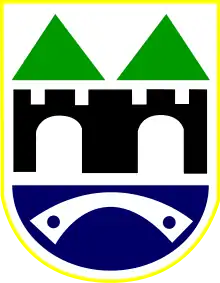.jpg.webp) | |
| Native name | Ulica Sarači (Bosnian) |
|---|---|
| Former name(s) | Petar II Karađorđević street |
| Length | 0.22 km (0.14 mi) |
| Location | Baščaršija |
| Coordinates | 43°51′34.09″N 18°25′46.41″E / 43.8594694°N 18.4295583°E |
| East | Baščaršija (main square) |
| West | Ferhadija street |
Sarači street is one of main pedestrian streets in Sarajevo, located in Baščaršija, Stari Grad Municipality. Sarači street is named after Saraç, a Turkish word for craftsmen who are making saddles.[1]
Sarači street is connecting Ferhadija street on west and main square on Baščaršija on east, and entire street is pedestrian zone. Numerous shops with traditional handicraft products are located in this street. It can be noticed that the passage from Sarači street into Ferhadija street is a line that separating or connecting the characteristics of the eastern and western culture inherited during the rich history, as well as the entire City of Sarajevo.[2][3]
Sarači street is located within "Historical City Area - Sarajevo Čaršija", which is declared in 2014 as National Monument of Bosnia and Herzegovina.[4]
History of name

This road existed as early as 1462, about which there is a trace in the vakufnama of Isa-Beg Ishaković from that year, in which this street is mentioned as a road. From 1928 to 1941, when it was connected with Ferhadija street,[5] it was named after Prince and later King Peter II Karadjordjevic, and in 1941, old name has been restored.
Together with Bazardžani street and Kazazi street, Sarači street is one of the first streets that were named in Sarajevo.[6]
Events
On April 6 2018, day of re-opening of the Sarajevo cable car, City Administration of Sarajevo organized exhibition of historical photos from family albums on which Sarajevo cable car is visible, named "Memories", and photos were exhibit in windows of all stores in Sarači street.[7][8]
Significant buildings

Several significant buildings and institutions are located in this street and some of them are:
- Morića Han
- Gazi Husrev-beg Mosque
- Gazi Husrev-beg's Museum (including Kuršumli mederesa)[9]
References
- ↑ "Šta znači Sarač". staznaci.com.
- ↑ Pobric, Alma; Sljivo, Selma; Mulaosmanovic, Naida (30 September 2019). "Touristic valorization of cultural and historical heritage of the central core of Sarajevo based on Hilary du Cros method". Journal of Geography, Politics and Society. 9 (3): 33–41. doi:10.26881/jpgs.2019.3.05.
- ↑ Clancy, Tim (26 May 2017). Bosnia & Herzegovina (Fifth ed.). Chalfont, St Peter. ISBN 9781784770181.
{{cite book}}: CS1 maint: location missing publisher (link) - ↑ "National Monuments of Bosnia and Herzegovina".
- ↑ "Ferhadija". Sarajevo.travel.
- ↑ "Znate li koje su najstarije ulice u Sarajevu?". Radio Sarajevo.
- ↑ "Uspomene na žičaru na fotografijama iz porodičnih albuma Sarajlija". vijesti.ba (in Bosnian).
- ↑ "Nakon 26 godina sa radom počinje Trebevićka žičara". N1 (in Bosnian). 6 April 2018.
- ↑ "Muzej "Gazi Husrev beg"". Gazi Husrev-begov vakuf (in Bosnian).
External links
 Media related to Sarači at Wikimedia Commons
Media related to Sarači at Wikimedia Commons
